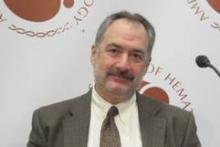In children and young adults with acute myeloid leukemia, the addition of the anti-CD33 antibody gemtuzumab-ozogamicin to standard chemotherapy cut 3-year risk of relapse by 17% and significantly improved event-free survival, according to a study published Aug. 4 in the Journal of Clinical Oncology.
The results contradict those from the controversial Southwest Oncology Group’s trial (SWOG) S0106, which led to the voluntary withdrawal of gemtuzumab-ozogamicin (GO) in 2010, said Dr. Alan Gamis of Children’s Mercy Hospitals and Clinics in Kansas City, Mo., and associates.
For the trial, the researchers randomized 1,022 children, adolescents, and young adults aged less than 1-29 years to receive either standard five-course chemotherapy alone, or standard treatment plus 3 mg/m2 of GO given once during induction course 1 and once during intensification course 2 (J. Clin. Onc. 2014 Aug. 4 [doi: 10.1200/JCO.2014.55.3628]).
Three-year event-free survival was 53.1% for the GO group, compared with 46.9% for the control group (hazard ratio, 0.83; 95% confidence interval, 0.70 to 0.99; P =.04), the investigators reported. In a post hoc analysis, 3-year risk of relapse was 32.8% for the intervention group, compared with 41.3% for controls (HR, 0.73; 95% CI, 0.58-0.91; P = 0.006), they said.
However, GO did not significantly affect 3-year overall survival (69.4% compared with 65.4% for the control arm; HR, 0.91; 95% CI, 0.74 to 1.13; P = .39), the investigators reported. Grade 3-5 adverse events were similar between the study arms, they added.
The trial did not find a statistically significant improvement in event-free survival for all risk subgroups – an increasingly common challenge as the biologic heterogeneity of AML has led to smaller study cohorts, the researchers said.
The results align with published trials in adults with low-risk and moderate-risk AML, wrote the investigators, who said more studies are needed to determine the best ways to administer GO and other CD33-targeted agents.
The study was funded by the National Cancer Institute. The authors reported no financial conflicts of interest.


